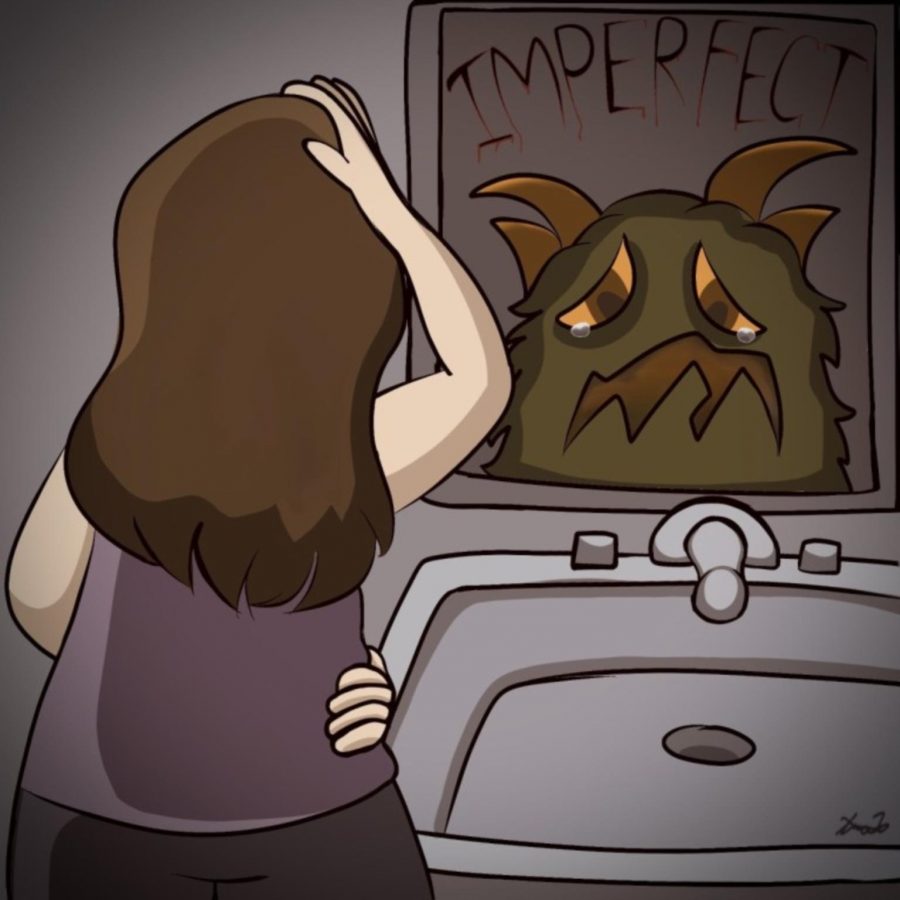Op-Ed: It’s Not Easy to Feel Beautiful
Cartoon by Ava Lochart ’21.
November 12, 2019
How many times have you looked in the mirror and felt that lump of disgust welling in the pit of your stomach? Or heard that tiny malicious voice whisper inside your head, telling you that you’re not good enough?
Body image impacts our daily lives more than one would think. Without realizing it, we force high standards on ourselves that can consume our every thought.
Picking up any fashion magazine, the first thing one sees is the seemingly perfect image of a model that dominates the cover. It jumps out at you, so much so that it’s almost impossible to miss.
Looking at these photoshopped images of perfection, it’s impossible not to feel inadequate, even as you know that the photo you see in front of you is fake. More than once, I’ve found myself wondering, “Why can’t I look like them? Should I look like that? What am I doing wrong?“
These are questions that shouldn’t concern me at such a young age, but they do. And more so than I would like.
According to the National Eating Disorders Association, “negative body image (or body dissatisfaction) involves feelings of shame, anxiety, and self-consciousness.”
Writing for Psychology Today, Dr. Romeo Vitelli, who specializes in adolescent mental health, writes, “with thinness presented as the ideal body shape and a necessary prerequisite for health and happiness, anyone falling short of this ideal can be vulnerable to depression, poor self-esteem, and general body dissatisfaction.”
American culture has an unhealthy obsession with unachievable beauty.
I accepted long ago that I will never look like everyone else. That doesn’t make it easy, though. I can’t help but feel that there’s something missing—something magical that will solve everything.
But why is there so much pressure to find something that may not exist? Why is appearance so important in our culture? Such insecurities can feel crippling. I speak from experience.
It’s difficult to avoid comparing myself to others. I often wonder why I can’t be thinner or smaller. I feel obese in comparison to some of my classmates, and I consistently wonder if it’s my own fault, despite everything I’ve done to fix it.
Unfortunately, people tend to focus on these flaws. I was bullied and picked on throughout elementary school because of my appearance. I was short, overweight, and struggled with speaking. My nickname, so kindly bestowed upon me in fifth grade, was “Acne Gorilla.”
As a result, my self-esteem plummeted and I became mildly depressed. I flinched away from mirrors and refused to look at photos of myself. Sometimes, I still do.
I’m sure I’m not an exception. Many people have stories of being bullied because they failed to live up to the impossible beauty standard. Their confidence almost always suffered as a consequence.
Some people waste their lives trying to achieve the ideal body. This feeds into a sad reality that American culture has an unhealthy obsession with unachievable beauty.
But why should we feel shame for looking different than a supermodel? No one should feel so awful about their weight and appearance that they can’t bear to look at themselves.
As teens, our worries should be geared toward school, hobbies, and everyday life—not a number on a scale.
The standards that we force upon ourselves tell us that we aren’t good enough— that we need fixing. But if anything needs fixing, it’s a societal cancer of instilling unhealthy and unrealistic expectations for how to look.
However, teens like me are getting inspiration from stars who aren’t ridiculously skinny.
“I’m not going to be able to please everyone with my outward appearance,” the singer Lizzo recently told People. “Someone’s always going to have a critique, someone’s always going to have some negativity to say about me. So all that matters is what I think of it. And I had to go so deep inside myself and look in the mirror.”
Accepting your reflection can be difficult, but you have to remember that it’s your body and your life—and nobody’s opinion is more important than your own.


























































